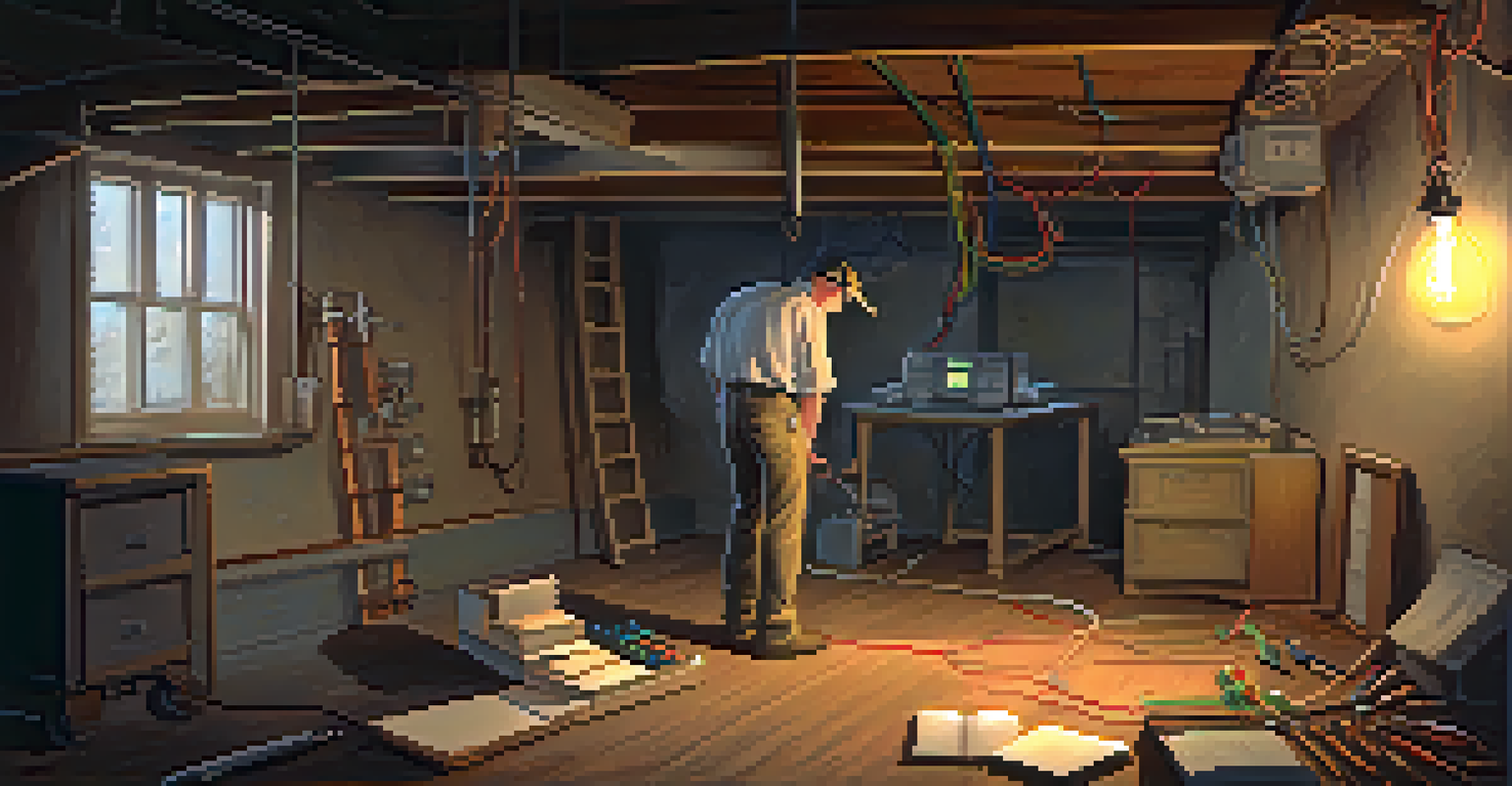Understanding the Role of Home Inspectors in Transactions

What is a Home Inspector and Their Role?
A home inspector is a licensed professional who evaluates the condition of a property before a sale. They provide buyers and sellers with a detailed report on the home’s structural integrity, systems, and any potential issues. Think of them as detectives for your home, uncovering hidden problems that could affect its value or safety.
An ounce of prevention is worth a pound of cure.
Their job goes beyond just looking at the surface; they inspect roofing, plumbing, electrical systems, and even the foundation. This thorough examination helps both buyers and sellers understand what they are getting into, potentially saving them from costly surprises later on. Ultimately, a home inspector acts as a trusted advisor during a significant financial decision.
In many ways, home inspectors are the unsung heroes of real estate transactions. While the excitement of buying a new home can overshadow practical concerns, these professionals ensure that buyers can make informed choices, adding a layer of security to the process.
The Importance of Home Inspections
Home inspections play a pivotal role in real estate transactions by identifying issues that could lead to costly repairs down the line. For instance, a small leak in the roof detected during an inspection could prevent extensive water damage in the future. This proactive approach not only protects buyers but also helps sellers address issues before listing their home.

Moreover, inspections can provide leverage in negotiations. If significant problems are discovered, buyers can request repairs or even renegotiate the price based on the inspector's findings. This transparency promotes trust between buyers and sellers, setting a positive tone for the transaction.
Home Inspectors Ensure Informed Choices
Home inspectors evaluate properties to reveal hidden issues, helping buyers and sellers make informed decisions.
In essence, the importance of home inspections cannot be overstated. They empower buyers with knowledge and help sellers present their property in the best light, thus facilitating smoother transactions.
Types of Home Inspections Available
There are various types of home inspections tailored to specific concerns. The standard home inspection covers the basics, but specialized inspections like pest, radon, or mold inspections may also be necessary. Each type serves a unique purpose and addresses different aspects of the property’s health.
The bitterness of poor quality remains long after the sweetness of low price is forgotten.
For example, a pest inspection focuses on identifying signs of termites or other wood-destroying organisms that can compromise the structure of the home. On the flip side, a radon inspection checks for harmful gas levels that could pose health risks to occupants. Knowing the right type of inspection for your situation can make all the difference in ensuring a safe purchase.
Ultimately, understanding the various types of inspections available helps buyers and sellers make informed decisions. It’s a bit like choosing the right tool for a job; using the right inspection can reveal hidden dangers that could affect your investment.
What to Expect During a Home Inspection
During a home inspection, expect a thorough examination of the property, typically lasting about two to three hours. The inspector will assess the interior and exterior, examining everything from the roof to the foundation. This hands-on process provides valuable insights into the home’s condition.
As a buyer, it's beneficial to accompany the inspector during the evaluation. This allows you to ask questions on the spot and gain a better understanding of any issues that arise. It's an opportunity to learn about the home’s systems and maintenance needs directly from an expert.
Inspections Prevent Costly Surprises
Conducting home inspections can identify potential problems early, saving buyers from expensive repairs later.
After the inspection, the inspector will provide a detailed report outlining their findings. This document serves as a crucial resource for both parties, guiding discussions on repairs and negotiations moving forward.
How to Choose the Right Home Inspector
Choosing the right home inspector is essential for a successful inspection. Start by seeking recommendations from trusted sources, such as friends, family, or your real estate agent. A little research goes a long way; check online reviews and credentials to ensure the inspector meets industry standards.
It's also a good idea to interview potential inspectors. Ask about their experience, what their inspection covers, and how they report their findings. A qualified inspector should be transparent and willing to answer your questions, making you feel confident in their abilities.
Remember, an inspector's expertise can significantly impact your home-buying experience. Selecting someone who not only understands the technical aspects but also communicates effectively can make all the difference.
Common Issues Found During Inspections
Home inspections often reveal common issues that can range from minor to significant. Some frequent findings include faulty wiring, plumbing leaks, and roof damage. Addressing these concerns early can prevent them from escalating into more serious problems.
For example, a small leak in a pipe may seem insignificant initially, but if left unattended, it can lead to mold growth and structural damage. Similarly, electrical issues, if not resolved, can pose safety hazards. Knowing what to watch for can help you navigate the home-buying process more effectively.
Choosing the Right Inspector Matters
Selecting a qualified home inspector is crucial, as their expertise and communication can significantly impact your buying experience.
Ultimately, understanding these common issues can prepare buyers for what they might face during an inspection. It’s a reminder that even a seemingly perfect home may have underlying problems that need attention.
The Impact of Inspections on Closing Deals
Home inspections can significantly impact the closing process of real estate transactions. If major issues are discovered, buyers may hesitate to proceed, leading to potential delays or even cancellations. On the flip side, a clean inspection report can expedite closing, providing peace of mind for all parties involved.
Moreover, inspections can influence negotiations. If problems arise, buyers might request repairs or a price adjustment, creating a dialogue that can either strengthen or weaken the agreement. This back-and-forth is a critical part of the process, and inspections often serve as the catalyst.

In summary, home inspections are not just a formality; they play a vital role in shaping the outcome of real estate deals. They ensure that both buyers and sellers are fully informed, ultimately leading to smoother transactions.